| Pages:
1
2
3
4 |
woelen
Super Administrator
        
Posts: 8014
Registered: 20-8-2005
Location: Netherlands
Member Is Offline
Mood: interested
|
|
This is a very interesting read. I am halfway the document now, and I enjoy reading this kind of stuff.
I have MeCN, so I'll try some of the experiments in the document. CrO3 dissolves in MeCN moderately well, giving an intensely dark brown solution. At
the same concentration in water, the solution is bright orange due to formation of dichromate ion. Probably this difference is due to the fact that
CrO3 does not form anionic species in MeCN, it simply dissolves as CrO3.
More will follow on this...
|
|
|
woelen
Super Administrator
        
Posts: 8014
Registered: 20-8-2005
Location: Netherlands
Member Is Offline
Mood: interested
|
|
I did the following experiment, and the result is quite unexpected:
- dissolve some CrO3 in MeCN, this gives a very dark brown solution
- add a single drop of 50% H2O2 and swirl
This simple experiment leads to formation of a beautiful dark blue/indigo liquid, which is clear. The liquid, sticking to the glass looks like a
beautiful kind of ink. The liquid behaves different from an aqueous solution. In aqueous solution, the deep blue/purple complex immediately
decomposes, and within one or two minutes nothing of this complex is left. It really is transient. In MeCN the complex seems to be more stable.
However, several minutes after I prepared the blue liquid, it suddenly starts foaming strongly, and a lot of heat is produced. The liquid becomes hot
and is almost blown out of the test tube. After this violent reaction, the liquid is somewhat turbid and it has a yellow/brown color.
So, MeCN seems to stabilize the complex CrO(O2).H2O somewhat, but it is dangerous stuff! It tends to suddenly decompose, apparently without any
warning. In my experiment, the liquid was very dilute, but if it were more concentrated, or even pure, then there could well have been an explosion.
|
|
|
blargish
Hazard to Others
  
Posts: 166
Registered: 25-9-2013
Location: Canada
Member Is Offline
Mood: Mode Push
|
|
Interesting dark coloured solution
Carried out the synthesis of potassium tetraperoxochromate(V) the other day, and it went pretty well. I obtained a nice quantity of very dark
red-brown (almost black) crystals. This was my second time performing the synthesis; the first time I got a fine crystalline red-brown powder, which I
assume to be the exact same compound, but with smaller particle size. Below is a pic of the solid from the first synthesis: (the second is still
drying)
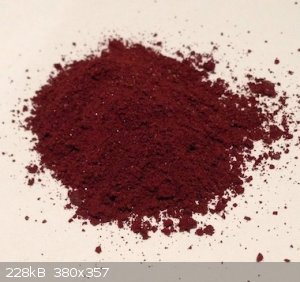
I then did some experimentation with the solid in aqueous solution, such as the standard decomposition in acidic environment forming the unstable blue
CrO(O2)2·H2O species (CrO5) which promptly decomposes to Cr(III).
However, I also found that adding 30% hydrogen peroxide to a solution of the tetraperoxochromate produced a dark, maroon coloured solution that slowly
evolved oxygen gas. This solution seemed stable for quite a length of time, but after I left it for a while I found that it had decomposed back into a
solution with the same colour as the original tetraperoxochromate solution. I then added some HCl to the resulting solution and found that it followed
the same behaviour as the original tetraperoxochromate solution in the formation of the blue peroxo complex. (yet this did seem to linger around
longer before decomposing. Not exactly sure what happened, but I'll be sure to repeat it when I get the time)
Below are pics of the maroon solution generated by the addition of hydrogen peroxide to the tetraperoxochromate and the original tetraperoxochromate
solution for comparison
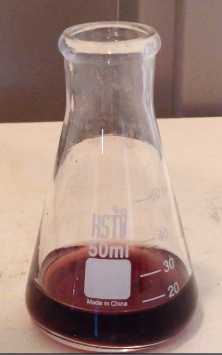 
I am just wondering what the nature of this solution could be. Looking at the diagram posted by Taoiseach on pg 3 of this thread, I guess this could
be the species [CrO(O2)2OH]- in the middle of the diagram. The hydrogen peroxide might act to oxidize the Cr(V) to
the Cr(VI) of the second species (as well as providing the slightly acidic environment needed as per the diagram), which slowly decomposes back to the
original tetraperoxochromate solution.
Still, this is all given that some other weird complex is not the explanation for the maroon colour.
Also, I am wondering if anyone has had any luck in the synthesis of the so-called violet perchromates, such as
K2Cr2O12, or the explosive tetraperoxochromate(VI) suggested by the aforementioned diagram.
BLaRgISH
|
|
|
woelen
Super Administrator
        
Posts: 8014
Registered: 20-8-2005
Location: Netherlands
Member Is Offline
Mood: interested
|
|
Interesting to see this thread come back alive. These peroxochromates are very interesting compounds. With some care, experimenting with them is very
rewarding.
I have never seen such a deep red solution from a chromium peroxo complex. It apparently only exists at very high concentrations of H2O2 and at the
right pH. Do you have any Ba-salts? It might be interesting to see whether you can precipitate some Ba-salt of this. The solution must be very dilute
if you started from K3CrO8, so it may be quite difficult or time consuming to precipitate the barium salt.
What happens on dilution. Does it keep the red color, or does it turn yellow/brown?
|
|
|
blargish
Hazard to Others
  
Posts: 166
Registered: 25-9-2013
Location: Canada
Member Is Offline
Mood: Mode Push
|
|
Upon dilution the red colour seems to be maintained.
Below are thee pics; the original tetraperoxochromate solution, the concentrated dark red solution from hydrogen peroxide addition, and the dilute
solution.
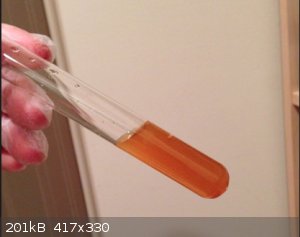 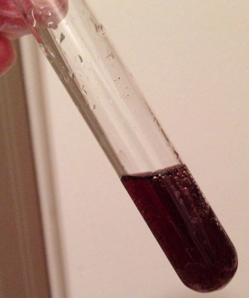 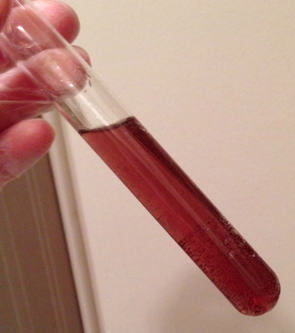
The concentrated solution evolved oxygen at a much quicker rate with respect to the more dilute solution.
I also added a solution of barium nitrate to a concentrated solution of the unknown complex and it immediately got lighter and cloudy. Slowly, a
precipitate was formed with an off-white coloration.
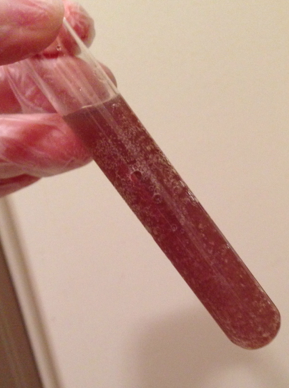 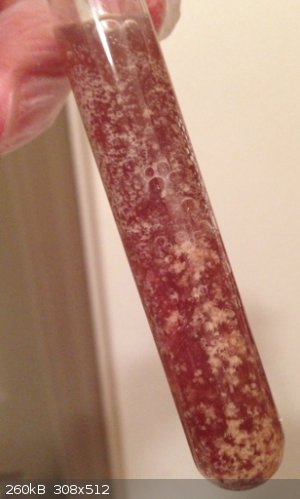
I have doubts of whether this is actually the barium salt of the complex in question due to the relatively large amount of precipitate in comparison
with the concentration of the original tetraperoxochromate solution. I have a feeling that this could just be barium peroxide; however, I had no time
to separate the solid from the solution and will be sure to do that soon in order to get a better idea of what it might be.
I will also attempt adding the barium nitrate solution to a dilute solution of the red complex to see if that makes a difference.
Apologies for the wacky picture sizes!
BLaRgISH
|
|
|
vano
National Hazard
   
Posts: 661
Registered: 22-3-2019
Location: Georgia
Member Is Offline
|
|
A mixture of crystals and powder.
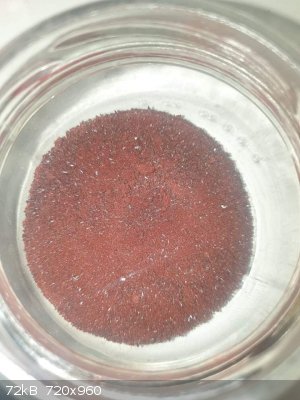
Small crystals
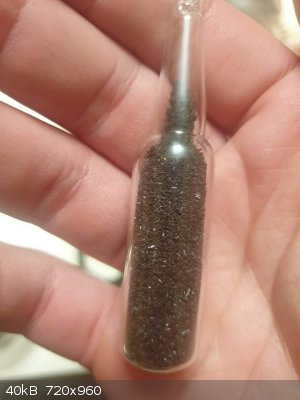
Also mine:
https://upload.wikimedia.org/wikipedia/ka/e/e5/%E1%83%99%E1%...
|
|
|
woelen
Super Administrator
        
Posts: 8014
Registered: 20-8-2005
Location: Netherlands
Member Is Offline
Mood: interested
|
|
Definitely much more red than mine. Interesting to see the color differences.
Do you still have some outside of your ampoule? Take a small amount and put that in a test tube (really small amount, just the tip of a small
screwdriver) and then heat the test tube over a flame. It should decompose with a single POP sound (explosive, not burning).
Last weekend I made a little movie of the explosion with my high speed camera (I have a camera, which can do 1000 frames per second at just over
1000x380 resolution, with shutter times on a per frame basis of 1/12800 second). With this camera I found out that the decomposition reaction of
K3CrO8 is really fast. I just have the same image in my video, and then in one frame, you see a gentle haze over the solid material, and in the next
frame all is gone and there is a yellow smoke, filling the lower 5 cm of the test tube (yellow color is due to K2CrO4). So, the decomposition takes
somewhere around 1 ms. It is accompanied with a loud POP sound. For this reason I tell you to take only a tiny amount of K3CrO8 for this experiment.
You don't want shattered glass flying around your ears.
|
|
|
vano
National Hazard
   
Posts: 661
Registered: 22-3-2019
Location: Georgia
Member Is Offline
|
|
Woelen, Unfortunately now I only have crystals in this ampoule. All gifts to friends who can not synthesize at home. I have tested it many times. The
crystals explode like popcorn and jump into the air. As you said it takes on a yellow color. I mixed the sulfur a few times and it made a very loud
noise. Interesting because I just put the mixture on the air, however if it is not like a hill, then it explodes like gunpowder.
|
|
|
| Pages:
1
2
3
4 |